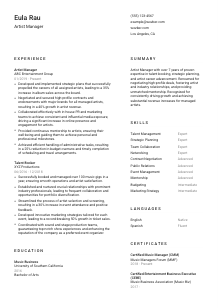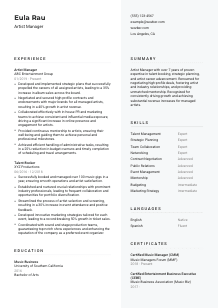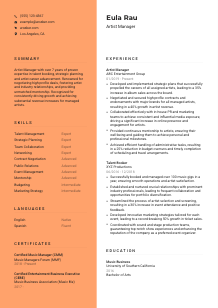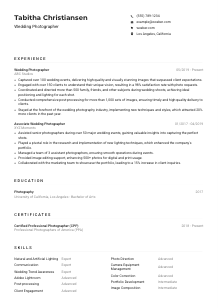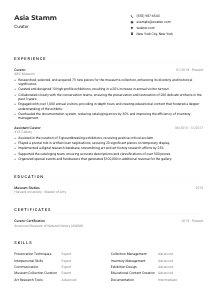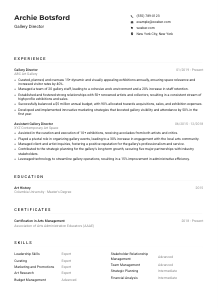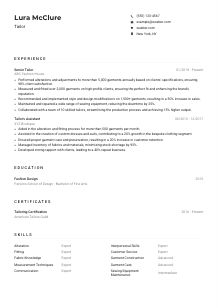Artist Manager Resume Example
Harmonizing careers, but feeling off-key with your resume? Tune in to this Artist Manager resume example, composed with Wozber free resume builder. It shows how you can orchestrate your managerial artistry to resonate with job demands, putting your candidates in the spotlight and your career in the applause zone!
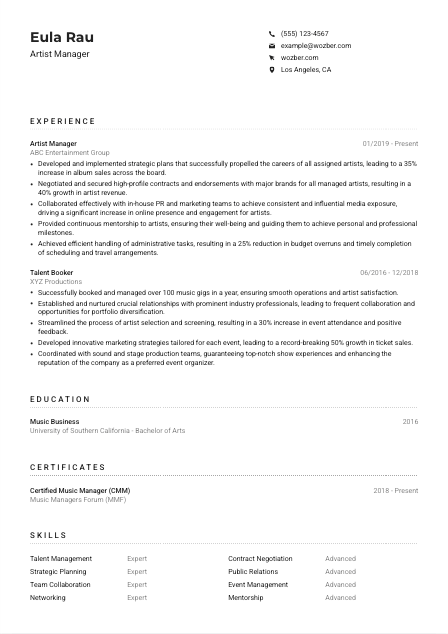
How to write an Artist Manager resume?
Navigating the vibrant but intricate landscape of the music industry, your resume as an Artist Manager isn't just a document, it's your backstage pass to the next big act in your career. Harnessing the power of Wozber's free resume builder, we're diving deep into the art of resume composition, hitting every note required for an ATS-compliant resume that's music to the ears of your future employers. Are you ready to tune your credentials to the rhythm of success? Let's make your resume sing!
Personal Details
In the music industry, the opening act is crucial. It sets the tone for what follows. This is exactly what your Personal Details section does. Let's ensure your resume starts on the right note, perfectly pitched to catch the attention of the hiring manager.
1. Name: Your Marquee
Think of your name as the headliner on your resume's marquee. It should stand out distinctly. A touch larger font than the rest of the document and bolded, perhaps, to ensure it's the first thing to catch the hiring manager's eye.
2. Job Title: Setting the Stage
Directly beneath your name, encore the position you're pursuing – "Artist Manager". This demonstrates immediate alignment with the job at hand, setting the stage for the rest of your resume.
3. Contact Info: Your Backstage Pass
Your contact information is your backstage pass, making it easy for employers to invite you to the next round. A professional email and a phone number is your minimal setup; ensure there's no typo in your contact details to avoid missing your cue.
4. Location: The Venue
"Must be located in Los Angeles, CA." As specified, if you're in LA, make it known. It assures the employer that you're already in the heart of the music industry, ready and available for whatever gig comes your way.
5. Web Presence: Your Online Stage
In this digital age, an online presence can amplify your credentials. Include a LinkedIn profile or a professional website if you have one, ensuring it syncs harmoniously with the information on your resume.
Takeaway
Your personal details section sets the tone for your resume. It's crucial that it's professionally in tune with the Artist Manager role you're eyeing. Consider it your career's opening act; make it memorable, engaging, and perfectly aligned with the expectations.





Experience
The heart of your resume beats in the Experience section. It's the crescendo of your career journey, showcasing the venues (companies) you've played, the gigs you've managed, and the artists you've propelled to stardom. Let's ensure your setlist is headliner-worthy.
- Developed and implemented strategic plans that successfully propelled the careers of all assigned artists, leading to a 35% increase in album sales across the board.
- Negotiated and secured high‑profile contracts and endorsements with major brands for all managed artists, resulting in a 40% growth in artist revenue.
- Collaborated effectively with in‑house PR and marketing teams to achieve consistent and influential media exposure, driving a significant increase in online presence and engagement for artists.
- Provided continuous mentorship to artists, ensuring their well‑being and guiding them to achieve personal and professional milestones.
- Achieved efficient handling of administrative tasks, resulting in a 25% reduction in budget overruns and timely completion of scheduling and travel arrangements.
- Successfully booked and managed over 100 music gigs in a year, ensuring smooth operations and artist satisfaction.
- Established and nurtured crucial relationships with prominent industry professionals, leading to frequent collaboration and opportunities for portfolio diversification.
- Streamlined the process of artist selection and screening, resulting in a 30% increase in event attendance and positive feedback.
- Developed innovative marketing strategies tailored for each event, leading to a record‑breaking 50% growth in ticket sales.
- Coordinated with sound and stage production teams, guaranteeing top‑notch show experiences and enhancing the reputation of the company as a preferred event organizer.
1. Highlighting Relevancy
Your resume should read like a well-curated setlist, each role you've played building up to this moment. Start by listing positions most relevant to an Artist Manager, showcasing your ability to manage and propel talent.
2. Titles & Venues
Just like billing on a concert flyer, the titles of the roles you've held and the names of your previous companies must stand out. Beginning with your most recent role ensures the hiring manager sees your current expertise first.
3. Choreographing Achievements
Each role should have bullet points detailing your accomplishments, mirroring the responsibilities in the job description such as "Developed and implemented strategic plans" or "Negotiated contracts." Be specific; if you can quantify your successes with percentages or figures, even better.
4. Tour Highlights
Remember to spotlight major achievements like a sold-out tour. Demonstrating your ability to excel in the role, bringing in measurable growth, or successfully managing high-profile artists will speak volumes.
5. Encore: Staying Relevant
While it's tempting to include every gig you've ever played, focus on the ones most relevant to the Artist Manager role. Your experience section should be a hit parade, not a deep track list.
Takeaway
Your experience section is the main act, compelling the hiring manager to keep reading. Tailor it to reflect your most relevant roles, sing your praises through quantifiable achievements, and make it crystal clear why you're the best choice for their next Artist Manager.
Education
Even in the creative chaos of the music industry, a solid educational background strikes a chord of reliability and expertise. Your Education section underscores your foundational knowledge – let's make sure it plays the right notes.
1. Degree on Display
"Bachelor's degree in Music Business, Arts Management, or related field." If you have it, flaunt it. Your degree is your ticket to many Artist Manager roles, so ensure it's prominently displayed.
2. Alma Mater & Graduation Date
The name of your university or institution and your year of graduation provides context for your educational achievements, giving a timeframe to your experience.
3. Syllabus Selections
While your degree title speaks volumes, don't miss a beat to highlight specific courses if they're directly pertinent to being an Artist Manager. Things like talent management, music marketing, or contract negotiation can be your bonus tracks.
4. Additional Accolades
If you graduated with honors or engaged in any noteworthy extracurricular activities that align with the Artist Manager role, this is your chance for a solo. But remember, keep it relevant and concise.
5. Continuous B-Sides
Your education doesn't end after you've tossed your graduation cap. Any seminars, workshops, or certifications that add depth to your role as an Artist Manager deserve a mention here.
Takeaway
An ATS-compliant resume harmonizes your educational achievements with the job at hand. Make it count by aligning your educational background with the demands of the Artist Manager role. Whether it's your degree, courses, or ongoing learning, make sure it's music to the ears of the hiring manager.
Certificates
In a sector as competitive as the music industry, certifications act as your standout solos, underscoring your dedication and expertise in areas critical to an Artist Manager. Let's orchestrate them to your advantage.
1. Certifications in the Spotlight
Certifications like "Certified Music Manager (CMM)" or "Certified Entertainment Business Executive (CEBE)" hit a high note on your resume. They align directly with the job description, making your expertise undeniable.
2. Selection Setlist
Just as in a concert, not every song makes it to the setlist; select your certifications with care. Prioritize those that resonate most with the Artist Manager role, ensuring they're current and relevant.
3. Release Dates Matter
The music industry evolves rapidly, and so does its required knowledge base. Include the dates of your certifications to demonstrate your commitment to staying up-to-date with industry standards and practices.
4. Continuous Learning & Growth
Your passion for continuous improvement is a trait employers search for. Regularly updating your certifications and pursuing new ones related to your field showcase your commitment to growth and staying ahead of the beat.
Takeaway
In the final analysis, your certifications section isn't just an add-on; it's a powerful testament to your dedication and readiness for the role. Highlight the certifications that best scream 'Artist Manager,' and keep the list tightly focused and up-to-date. Let your certifications take center stage, demonstrating you're always in tune with the industry's leading edge.
Skills
In the harmony of your resume, the Skills section hits like the bass line – understated yet fundamental. For an Artist Manager, blending a mix of soft and hard skills is crucial. Let's fine-tune this section to ensure it resonates perfectly with the job demands.
1. Harmonizing with Job Requirements
Dive into the job description and pick up on both the overt and nuanced skills required. Everything from talent management to strategic planning is your genre. Detail them, marrying your skills perfectly with the job's demands.
2. The Skills Ensemble
Create a rich mix of hard and soft skills. Include key skills directly from the job description like "Networking" and "Contract Negotiation," and complement these with soft skills like "Team Collaboration" and "Mentorship" to showcase your all-rounded abilities.
3. The Power of Brevity
A tight, well-organized Skills section is like a hit single - it gets the message across effectively and memorably. Stick to the most relevant skills that demonstrate your fit for the Artist Manager role, ensuring clarity and impact.
Takeaway
Your skills section is where you get to solo, showcasing the breadth and depth of your professional repertoire. Craft it with care, ensuring every skill listed sings in harmony with the requirements of the Artist Manager role. Make it clear, concise, and compelling – the rest of your resume sets the stage, and your skills bring the house down.
Languages
The music industry is global, and the ability to communicate in multiple languages can be a significant asset, especially in artist management. While English is the must-have for the Artist Manager role, showcasing additional languages could add an interesting verse to your professional song.
1. Core Lyric: English Proficiency
"English language competency is a must." This line from the job description is your chorus. Ensure your fluency in English is evident, not just in this section but throughout the resume.
2. Adding Versatility
If you're fluent in languages beyond English, list them. Each additional language is like an added instrument to your band, making you more versatile and appealing to a wider audience (or, in this case, market).
3. Honesty in Proficiency
Be clear and honest about your language skills. Whether you're 'Fluent' or at an 'Intermediate' level, clear delineation ensures there are no surprises down the line, and it sets realistic expectations.
4. Global Stage
Understanding the scope of the role is critical. If working with international artists or tours is a possibility, showcasing your multilingual capabilities could be a standout factor, hinting at your capacity to manage diverse teams and artists.
5. Cultural Harmony
Languages are more than just words; they're bridges to cultures. Showing language diversity on your resume underlines your ability to navigate and harmonize diverse cultural landscapes, a key skill in managing artists from different backgrounds.
Takeaway
In the world's grand arena, every language you speak opens up new stages for opportunity and connection. Display your linguistic skills with pride, considering them not just as tools for communication but as pathways to deeper engagements and richer experiences in your career as an Artist Manager.
Summary
The opening act is crucial, but the headliner leaves the lasting impression. Your Summary section is your chance to shine, encapsulating your career's highlights and making a compelling case for why you are the perfect fit for the Artist Manager position.
1. Tune into the Job Essence
Begin by internalizing the essence of the job. Understanding what makes an Artist Manager invaluable allows you to craft a summary that resonates closely with the role's core demands.
2. Opening Act
Introduce yourself with a solid opening line, setting the stage for your professional narrative. Highlight your years of experience and areas of expertise to immediately catch the reader's attention.
3. The Chorus
Dive into the details, touching on key responsibilities and achievements. Utilize elements from the job description like "Negotiated high-profile contracts" or "Developed strategic plans," and pair them with quantifiable outcomes from your career.
4. The Finale
Keep your summary tight and impactful - three to five lines that leave no doubt you are the Artist Manager they need. It's your solo, the crescendo that sums up why you're not just another applicant but the star they've been scouting for.
Takeaway
Your Summary is your headline act, the final compelling pitch on why the role should be yours. Pull out all the stops, keep it laser-focused on the needs of the Artist Manager role, and make it an ovation-worthy performance. Strike the right chords by blending your unique accomplishments with the job requirements, and you'll leave them eager for your encore.
Launching Your Artist Manager Journey
You've tuned every string and checked every scale. Your resume is now a harmonious composition, expertly aligned with the demands of an Artist Manager role and ready to take center stage under the ATS spotlight. With Wozber's free resume builder at your fingertips, including ATS-friendly resume templates and an ATS resume scanner, you're not just ready; you're set for a standing ovation. Turn the spotlight on, it's showtime!

- Bachelor's degree in Music Business, Arts Management, or related field.
- Minimum of 5 years of experience in talent booking, artist management, or a related field.
- Strong network and established relationships within the music industry.
- Exceptional communication, negotiation, and interpersonal skills.
- Relevant certifications such as Certified Music Manager (CMM) or Certified Entertainment Business Executive (CEBE) are preferred.
- English language competency is a must.
- Must be located in Los Angeles, CA.
- Develop and implement strategic plans to advance the careers of assigned artists.
- Negotiate contracts, endorsements, and booking deals on behalf of the artists.
- Coordinate with PR and marketing teams to ensure maximum exposure and growth for the artists.
- Provide guidance and mentorship to artists, ensuring their personal and professional well-being.
- Handle administrative tasks including budgeting, scheduling, and travel arrangements.





